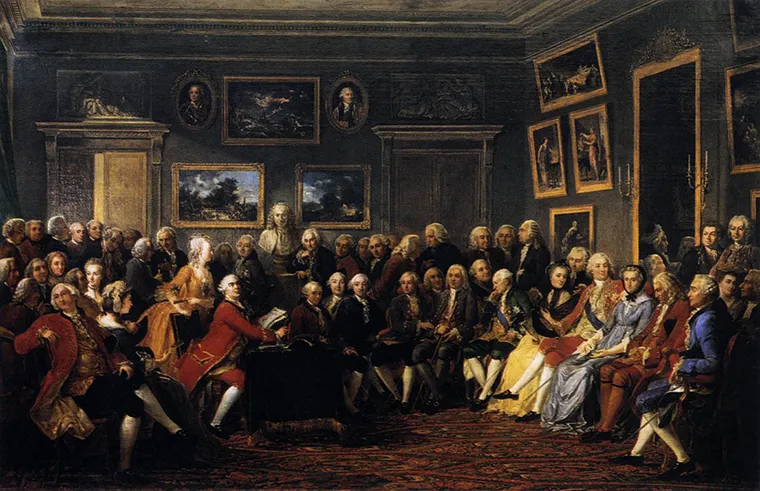
The Influence of the Enlightenment on Political Revolutions
The Enlightenment, also known as the Age of Reason, was a transformative intellectual and cultural movement that swept across Europe during the 17th and 18th centuries. This period witnessed a profound shift in thinking, marked by a fervent embrace of reason, individualism, and the scientific method as tools for understanding the world and improving human society. The Enlightenment’s impact reverberated throughout the globe, fundamentally reshaping Western society and profoundly influencing the political revolutions that defined the modern era. This essay will explore the intricate relationship between the Enlightenment and political revolutions, examining the key ideas, influential thinkers, pivotal events, and lasting legacies of this transformative period.
I. The Enlightenment’s Core Tenets: A Foundation for Revolution
At the heart of the Enlightenment lay a rejection of traditional authority and a fervent belief in the power of human reason. Thinkers of this era challenged established hierarchies, religious dogma, and absolute monarchies, advocating for individual liberty, popular sovereignty, and governmental accountability. Several core tenets defined this intellectual revolution:
Reason and Empiricism: The Enlightenment championed reason and empirical observation as the primary means of acquiring knowledge. This contrasted sharply with the prevailing reliance on religious faith, tradition, and superstition. Thinkers emphasized the importance of critical thinking, skepticism, and the systematic investigation of the natural world. This emphasis on evidence-based reasoning laid the groundwork for scientific advancements and a more rational approach to governance.
Individualism: The Enlightenment placed unprecedented emphasis on the individual. The focus shifted from the collective—the church, the state, the family—to the individual’s rights, autonomy, and potential. This emphasis on individual worth and dignity challenged the hierarchical social structures of the time, fostering a spirit of self-reliance and personal responsibility.
Natural Rights: Building upon earlier ideas, Enlightenment thinkers articulated the concept of natural rights—inalienable rights inherent to all individuals, independent of any government or social institution. John Locke’s articulation of life, liberty, and property as fundamental rights became a cornerstone of revolutionary thought, profoundly influencing the American and French Revolutions.
Social Contract Theory: This concept, developed by thinkers like Thomas Hobbes, John Locke, and Jean-Jacques Rousseau, proposed that governments derive their legitimacy from the consent of the governed. The social contract implied a reciprocal relationship between the ruler and the ruled, where the government’s authority is conditional upon its protection of the people’s rights and freedoms. This theory provided a powerful justification for revolution when governments failed to uphold their end of the contract.
Separation of Powers: Inspired by Montesquieu’s work, the idea of separating governmental powers into legislative, executive, and judicial branches gained traction. This division aimed to prevent tyranny by creating a system of checks and balances, ensuring that no single entity could amass excessive power. This principle became a fundamental component of many modern constitutions.
Religious Toleration: The Enlightenment witnessed a growing movement towards religious toleration and freedom of conscience. Thinkers like Voltaire championed freedom of thought and expression, arguing that religious persecution was incompatible with reason and individual liberty. This shift towards religious pluralism paved the way for greater social harmony and acceptance of diverse beliefs.
II. Key Enlightenment Thinkers and Their Influence
The Enlightenment was not the work of a single individual but a collective effort of numerous brilliant minds. Several thinkers stand out for their profound impact on the course of political revolutions:
John Locke (1632-1704): Locke’s Two Treatises of Government articulated the concept of natural rights and the social contract theory. His ideas on limited government, individual liberty, and the right to revolution profoundly influenced the American Declaration of Independence and the development of liberal democracy.
Jean-Jacques Rousseau (1712-1778): Rousseau’s The Social Contract offered a more radical interpretation of the social contract, emphasizing the general will and popular sovereignty. His emphasis on participatory democracy and the importance of civic virtue resonated strongly with the French revolutionaries.
Voltaire (1694-1778): A prolific writer and outspoken critic of religious intolerance and absolute monarchy, Voltaire championed freedom of speech, religious toleration, and the separation of church and state. His satirical writings exposed the abuses of power and inspired generations of reformers.
Montesquieu (1689-1755): Montesquieu’s The Spirit of the Laws advocated for the separation of powers within government, a crucial element in preventing tyranny. His analysis of different forms of government and their suitability to various societies profoundly influenced the design of constitutional governments.
Immanuel Kant (1724-1804): Kant’s work emphasized the importance of reason and autonomy in shaping human morality and political life. His concept of categorical imperative—acting only according to principles that one would wish to become universal laws—provided a moral foundation for individual rights and just governance.
Adam Smith (1723-1790): Although primarily an economist, Smith’s ideas on free markets and laissez-faire economics had significant political implications. His emphasis on individual economic liberty and limited government intervention influenced the development of capitalist systems and challenged mercantilist policies.
III. The Spread of Enlightenment Ideas and the Rise of Revolutionary Sentiment
The dissemination of Enlightenment ideas was facilitated by several factors. The printing press played a crucial role in enabling the mass production and distribution of books, pamphlets, and newspapers, enabling a wider audience to engage with these transformative ideas. Salons, informal gatherings of intellectuals and artists, provided forums for the exchange of ideas and the dissemination of Enlightenment thought. The rise of literacy and the expanding reach of education also contributed to the broader dissemination of these revolutionary concepts.
Enlightenment ideas took root in various parts of Europe and its colonies, fueling discontent with existing political systems. The growing middle class, fueled by economic expansion, increasingly sought greater political participation and representation. The perceived injustices of absolute monarchies, coupled with the intellectual ammunition provided by Enlightenment thinkers, created a fertile ground for revolutionary movements.
IV. The American Revolution: An Enlightenment Crucible
The American Revolution (1775-1783) stands as a prime example of the Enlightenment’s influence on political action. The American colonists, deeply influenced by Lockean ideas of natural rights and the social contract, rebelled against British rule, citing the violation of their fundamental freedoms.
The Declaration of Independence (1776), a powerful articulation of Enlightenment principles, explicitly stated that governments derive their just powers from the consent of the governed and that individuals possess inalienable rights to life, liberty, and the pursuit of happiness. The newly formed United States, guided by Enlightenment principles, established a republican government based on representative democracy, separation of powers, and checks and balances. The American experiment in self-governance served as a powerful inspiration for revolutionary movements elsewhere.
V. The French Revolution: A More Radical Transformation
The French Revolution (1789-1799) was a more radical and tumultuous event, marked by greater violence and social upheaval. However, Enlightenment ideas also played a crucial role in shaping this revolution. Rousseau’s concept of popular sovereignty and the general will fueled the revolutionary fervor, while Voltaire’s advocacy for individual liberties and religious toleration contributed to the dismantling of the ancien régime.
The French Revolution aimed to create a more just and equitable society, abolishing feudal privileges and establishing a republic based on the principles of liberty, equality, and fraternity. Though marred by the Reign of Terror, the revolution ultimately led to significant reforms, including the abolition of feudalism, the declaration of human rights, and the establishment of a more representative government (albeit temporarily). The revolution’s impact extended far beyond France, inspiring revolutionary movements across Europe and beyond.
VI. The Enlightenment’s Impact on Subsequent Revolutions and Political Thought
The Enlightenment’s influence extended far beyond the American and French Revolutions. Its principles of self-governance, individual rights, and popular sovereignty inspired numerous subsequent revolutionary movements, including those in Latin America, Haiti, and various parts of Europe during the 19th century. The legacy of the Enlightenment continues to shape contemporary political thought and practice.
The rise of liberal democracy, characterized by representative government, individual rights, and the rule of law, is a direct consequence of the Enlightenment’s impact. The concept of human rights, enshrined in international declarations and conventions, owes a significant debt to Enlightenment thinkers who emphasized the inherent dignity and worth of every individual. The struggle for social justice, gender equality, and racial equality continues to draw inspiration from the Enlightenment’s emphasis on individual liberty and the elimination of oppressive hierarchies.
VII. Criticisms and Limitations of the Enlightenment
Despite its transformative influence, the Enlightenment has faced criticisms. Some argue that its emphasis on reason and individualism neglected the importance of emotions, community, and tradition. Others critique the Enlightenment’s role in justifying colonialism and imperialism, arguing that its emphasis on reason and progress was often used to rationalize the exploitation of non-European peoples. Furthermore, the Enlightenment’s focus on abstract principles sometimes overlooked the realities of power, inequality, and social injustice within European societies.
VIII. The Enduring Legacy of the Enlightenment
Despite its limitations, the Enlightenment’s enduring legacy is undeniable. Its emphasis on reason, individual rights, and popular sovereignty continues to shape our understanding of politics, society, and the human condition. While the Enlightenment was not a utopian project, its contributions to the development of modern democracy, human rights, and the pursuit of a more just and equitable world remain profound and enduring. The ongoing struggles for liberty, equality, and justice across the globe continue to draw inspiration from the ideals and principles articulated during this transformative period in human history. The Enlightenment remains a potent force shaping political discourse and inspiring efforts to create a more just and equitable future for all. Its legacy serves as a constant reminder of the power of ideas to transform societies and inspire movements for social change. The ongoing dialogue surrounding the Enlightenment’s contributions and limitations serves as a testament to its ongoing relevance in contemporary society.


